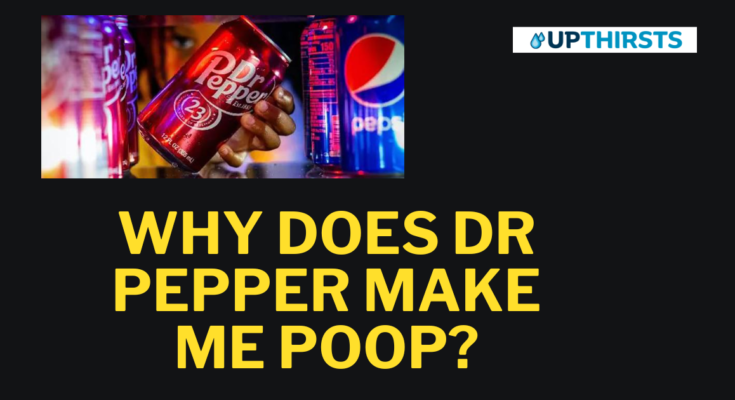WHY DOES DRINKING DR PEPPER MAKE ME POOP?
Introduction
Drinking Dr Pepper can have a surprising effect on your bowels. It has been known to cause an urge to poop, and can make you feel like you need to go to the bathroom.
This is because of the combination of caffeine, artificial sweeteners, and carbonation in the drink. If you’re wondering why drinking Dr Pepper makes you poop, you’re in the right place. In this article, we’ll discuss the science behind why this phenomenon occurs, and other factors that can also make you poop.
Why Does Drinking Dr Pepper Make Me Poop?
Drinking Dr Pepper may cause you to have an urge to go to the bathroom and poop. This is because of the caffeine and artificial sweeteners, as well as the carbonation in the drink.
Caffeine is a stimulant that can speed up digestion, leading to the need for a bathroom break. Artificial sweeteners can also cause abdominal discomfort and carbonation can lead to bloating and gas. Other factors that can make you poop include your diet, exercise and stress.
Eating a diet high in fiber can help regulate your bowel movements, while exercise can also help keep your digestive system running smoothly. On the other hand, can cause constipation, so try to reduce it with healthy habits like yoga or meditation.
The Science Behind The Phenomenon
Drinking Dr Pepper can stimulate your bowels and give you an urge to go to the bathroom. The caffeine in the soda is a diuretic, which can increase the need for a number of trips to the restroom throughout the day. Artificial sweeteners and carbonation can have a laxative effect, which can also contribute to having to go too often.
So next time you grab a can of Dr Pepper, be prepared to make a few more trips to the loo! Other factors can also affect your need to go, such as diet, exercise and stress.
If you have a diet that’s high in fiber, you’re likely to have to make more trips to the restroom. Exercise increases the metabolism, which can prompt your body to move waste through the system, thus contributing to your urge to use the bathroom.
Stress can also cause your body to send signals to your large intestine, making your need to go increase. In conclusion, if you’re experiencing the urge to go to the bathroom after drinking Dr Pepper, you’re not alone!
It could be due to the diuretic, laxative or other effects that come from the ingredients in the soda. But also be aware of other lifestyle factors that could be at play. So make sure to keep an eye on your diet, exercise and stress levels – they could all be making you need to go more often than usual.

does dr pepper have a laxative effect
Artificial Sweeteners
When it comes to artificial sweeteners, it’s important to know what’s in your Dr Pepper. Some artificial sweeteners can cause diarrhea, which may be why you’re pooping after you drink it.
Sugar alcohols like xylitol, sorbitol, and mannitol can cause stomach discomfort and sometimes lead to having to go to the bathroom more often. Some people are more sensitive to the effects of artificial sweeteners, so if you’re one of them, it might be best to avoid them. If you’re a fan of Dr Pepper and don’t want to give it up, there are a few things you can do.
Try drinking it without any artificial sweeteners. Make sure you’re drinking plenty of water throughout the day, as dehydration can cause digestive issues. If you’re still having issues, try switching to a different type of soda or drink that doesn’t contain artificial sweeteners.
Carbonation
Carbonation is a major contributor to the Dr Pepper-poop phenomenon. Carbonated beverages, like Dr Pepper, contain carbon dioxide gas.
As you drink it, the gas is released, giving the drink its fizz. This gas is then absorbed into your bloodstream and is eventually expelled from your system as gas – and you guessed it poop! Carbonation can also speed up your digestion, resulting in a faster transit of food through your digestive tract.
If you’re looking for a reason why you need to take a pit stop after drinking your Dr Pepper, it’s likely because of its carbonated goodness.
Apart from the carbonation, the artificial sweeteners found in Dr Pepper can also contribute to the urge to poop. Artificial sweeteners like aspartame, saccharin, and sucralose have been linked to a higher likelihood of developing diarrhea.
While you may be choosing Dr Pepper as a healthier alternative to a sugary soft drink, the artificial sweeteners can actually be doing more harm than good. If you’re drinking Dr Pepper in large quantities, it could be making the poop-tuation worse.
Since carbonated drinks can cause bloating, drinking too much of it can make you feel even more uncomfortable. The amount of caffeine in a single can of Dr Pepper can cause dehydration, which can add to the feeling of needing to poop. If you’re drinking Dr Pepper on the regular, it might be best to cut back your intake to avoid the dreaded poop-tuation.
Exercise
Exercising regularly can help regulate your body’s digestive system, as well as help your body create natural peristalsis, a wave-like motion that helps move food through your intestines. If you’re having problems with feeling like you need to poop after drinking Dr Pepper, try exercising more. The physical activity can help your body create its own natural rhythm, enabling it to better digest food and expel waste more efficiently.
Exercise can help you release any built-up stress that can also contribute to digestive issues. So even if you’re not a fan of going to the gym, try adding a few brisk walks throughout the day or doing some light stretches before bed to help your body regulate itself better.
conclusion
In conclusion, the intriguing question of why Dr Pepper might induce bowel movements has taken us on a fascinating journey through physiology, nutrition, and individual reactions to certain ingredients. While no conclusive evidence directly links Dr Pepper to a laxative effect for everyone, some individuals may experience gastrointestinal responses due to various factors.
The complex interplay of caffeine, sugars, and artificial sweeteners present in Dr Pepper may contribute to the laxative-like effect observed in some people. Understanding one’s tolerance to these components and recognizing the potential impact on digestive processes becomes crucial in decoding this phenomenon.
Moreover, the role of carbonation, acidity, and personal gut sensitivity adds another layer to the intricate puzzle. The effects of carbonated beverages on the digestive system can vary widely from person to person, emphasizing the importance of acknowledging individual responses.
As we navigate the intriguing landscape of the digestive system and its interactions with beverages like Dr Pepper, it becomes clear that personalized reactions play a significant role. While some may enjoy the effervescent refreshment without any noticeable effects on bowel habits, others might find themselves unexpectedly visiting the restroom.
In the spirit of curiosity and self-awareness, this exploration encourages individuals to be mindful of their bodies’ responses to different stimuli. Whether it’s the unique blend of flavors in Dr Pepper or the individual sensitivities of the digestive system, paying attention to these nuances enhances our understanding of how food and beverages can impact our well-being.
In essence, the question of why Dr Pepper makes some individuals poop underscores the intricate relationship between what we consume and how our bodies respond. It serves as a reminder that our digestive systems are wonderfully complex and unique, responding to stimuli in ways that are as individual as each person.
As we conclude this investigation, let it be a testament to the marvels of the human body and the ongoing journey of discovery we embark upon in understanding the intricacies of our physiological responses. So, whether you’re sipping Dr Pepper for the rich blend of flavors or pondering the mysteries of digestive reactions, may your curiosity persist and your understanding of your body deepen. Cheers to the enigma of human physiology and the delightful tapestry of flavors that make our culinary experiences unique and endlessly intriguing.
FAQs
- Why does Dr Pepper make some people experience bowel movements?
-
- The exact reason varies from person to person, but it could be attributed to the combination of ingredients like caffeine, sugars, and artificial sweeteners in Dr Pepper.
- Does caffeine in Dr Pepper contribute to its potential laxative effect?
-
- Yes, caffeine is a known stimulant that can have a laxative effect on some individuals. Dr Pepper contains caffeine, and its impact on bowel movements can be influenced by individual tolerance levels.
- How do sugars in Dr Pepper play a role in digestive processes?
-
- The high sugar content in Dr Pepper may contribute to an osmotic effect, drawing water into the intestines and potentially promoting bowel movements.
- Do artificial sweeteners in diet versions of Dr Pepper have a similar effect?
-
- Artificial sweeteners like aspartame or sucralose in diet sodas might affect the gut microbiota and could cause gastrointestinal responses, although the evidence is not definitive.
- Is the carbonation in Dr Pepper a factor in its potential laxative effect?
-
- Carbonation alone might stimulate the digestive system, but its role in the laxative effect of Dr Pepper varies among individuals.
- Could the acidity of Dr Pepper contribute to digestive changes?
-
- The acidity of Dr Pepper might influence the stomach’s pH, potentially impacting digestive processes, though individual responses vary.
- Are there particular populations more susceptible to Dr Pepper’s laxative effect?
-
- Individuals with sensitive digestive systems, those prone to irritable bowel syndrome (IBS), or those with certain food sensitivities might be more susceptible to Dr Pepper’s potential laxative effect.
- How long does the laxative effect of Dr Pepper typically last?
-
- The duration varies widely among individuals and is influenced by factors such as overall health, tolerance to specific ingredients, and the amount of Dr Pepper consumed.
- Can consuming Dr Pepper regularly lead to long-term digestive changes?
-
- Regular consumption might impact gut health over time, but individual responses vary, and long-term effects are not universal.
- Are there ways to enjoy Dr Pepper without experiencing digestive changes?
-
- Moderation, staying hydrated, and being mindful of individual tolerance levels are strategies to enjoy Dr Pepper without experiencing pronounced digestive effects. If concerns persist, consulting a healthcare professional is advisable.

